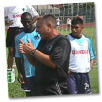Train for Work Capacity Not Endurance
We have all heard the axiom that more is not better. But within each of us there is a fundamental insecurity that we are not doing enough, so we do extra work. This seems to be especially true in an endurance dominated event. The result is that we lose sight of our objective in training which is to become a faster cyclist, runner or a swimmer. The work should not be an end in itself but a means to an end. That end is the improvement of performance. All training should be in pursuit of this objective.
Work Capacity is the ability to tolerate a high workload and to recover sufficiently for the next workout or competition. Raising work capacity will improve the athlete’s capacity to resist fatigue. It involves the functional efficiency and coordination of the cardiovascular, metabolic, and nervous system. With all these systems working together it is closely related to speed, strength, flexibility, and coordination. It is more than endurance. The key is functional efficiency of all systems working together to increase work capacity. An increase in work capacity will allow the athlete to work more efficiently and get more out of each training session. In the language of training theory it falls into the category of General Physical Preparation (GPP) type of work.
In order to raise work capacity with the objective of improving performance it is necessary to incorporate a mix of three elements:
1) Capacity - The total amount of energy available to perform work.
2) Power - Amount of energy that can be produced per unit of time.
3) Efficiency - Optimal use of the energy available.
The tendency is to emphasize capacity to the exclusion of power and efficiency. To be most effective it is a blend of all three depending on the individual athletes strengths and weaknesses and the particular sport they are preparing for. The most overlooked of the three and yet the one that has the most potential for improvement lies with efficiency. Improving efficiency allows greater utilization of the capacity and power available.
How do you achieve this? Proper periodization which is essentially having a plan and working that plan. As detailed record keeping as possible to provide objective feedback. Know yourself by honestly assessing your strengths and weaknesses. Know your sport. Know yourself, how have you achieved the best results?
Conceptually this all seems very simple and it is, but putting it into practice is what is tough. It is much easier to fall back into the security of quantification rather than preparing to compete.


2 Comments:
Very well said!
Will
Hi Vern, excellent article. How would a basket ball player train increase work capacity as a means of GPP?Thanks, Ian
Post a Comment
<< Home